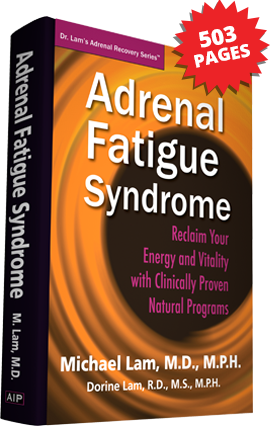5 Reasons to Buy Adrenal Fatigue Syndrome Book
 This book comes with Advanced Symptoms of Adrenal Fatigue Syndrome* book, Dr. Lam's Adrenal Quickstart video streaming, $20 coupon off your purchase of Dr. Lam's Adrenal Yoga Exercise Series, and Dr. Lam's Exclusive Online Recovery Module (this feature contains over 8 hours of additional streaming material and more than 30 exclusive articles to aid your recovery from Adrenal Fatigue).
This book comes with Advanced Symptoms of Adrenal Fatigue Syndrome* book, Dr. Lam's Adrenal Quickstart video streaming, $20 coupon off your purchase of Dr. Lam's Adrenal Yoga Exercise Series, and Dr. Lam's Exclusive Online Recovery Module (this feature contains over 8 hours of additional streaming material and more than 30 exclusive articles to aid your recovery from Adrenal Fatigue).
* Available only with purchase of physical book.
 Although conventional medicine fails to recognize Adrenal Fatigue Syndrome, we know that it is real, and you need to know that you are not alone. You also need to know that recovery is possible, and help is available. Right here. Right now. Guiding you in your recovery is the primary focus of this book.
Although conventional medicine fails to recognize Adrenal Fatigue Syndrome, we know that it is real, and you need to know that you are not alone. You also need to know that recovery is possible, and help is available. Right here. Right now. Guiding you in your recovery is the primary focus of this book.
 You need to know the full scientific basis, particularly from a neuroendocrine perspective, of Adrenal Fatigue Syndrome and its clinical relevance to your specific experience. Until you and your doctor know the root cause of your suffering, long term successful recovery is almost impossible. The reason is simple—you cannot fix something when you don't know what is wrong with it.
You need to know the full scientific basis, particularly from a neuroendocrine perspective, of Adrenal Fatigue Syndrome and its clinical relevance to your specific experience. Until you and your doctor know the root cause of your suffering, long term successful recovery is almost impossible. The reason is simple—you cannot fix something when you don't know what is wrong with it.
 This book is for anyone wishing to avoid this potentially debilitating condition that has now reached epidemic proportion. Whether you are tired occasionally because of a stressful event, or experience fatigue all the time, you can only benefit by knowing more about Adrenal Fatigue Syndrome.
This book is for anyone wishing to avoid this potentially debilitating condition that has now reached epidemic proportion. Whether you are tired occasionally because of a stressful event, or experience fatigue all the time, you can only benefit by knowing more about Adrenal Fatigue Syndrome.
 In short, we believe you are entitled to our comprehensive approach that attempts to explain the physiology and chemistry involved in this potentially devastating and life-changing condition. In our experience, patients are eager for answers, and they are surely smart enough to take in the scientific information that explains what is going in their bodies.
In short, we believe you are entitled to our comprehensive approach that attempts to explain the physiology and chemistry involved in this potentially devastating and life-changing condition. In our experience, patients are eager for answers, and they are surely smart enough to take in the scientific information that explains what is going in their bodies.
Reclaim Your Energy and Vitality
Yes, I want this bookWhat They Say about Dr. Lam and Adrenal Fatigue Syndrome
When we found Dr. Lam, I was what he called the living dead. I literally was on death's doorstep. Not one person associated with Western Medicine could find anything wrong with me, and my health was declining rapidly. I have been to over thirty doctors and not one of them has helped me in the slightest. Dr. Lam saved my life and set me on the road to recovery. Thank you for saving my life!
– Dena H., Adrenal Fatigue Syndrome Sufferer
Thank you kindly for this speedy and clear response. I can't thank you enough and wish there were more doctors like you. It's people like you who prove that medicine still remains the noblest of professions. Thank you again for your comprehensive explanation and a game plan—deeply appreciated.
– N.S., Adrenal Fatigue Syndrome Sufferer
Thank you so very, very much for all of your good advice and help. Your detailed analysis and in-depth articles have been extremely useful and have helped my Doctors to understand what is happening within my system. Now I know that I need to support my body and be very careful of pushing it. I also know what type of things will help support my body and what type of signs I need to look for. Keep up the great work you are doing and thanks so much once again!
– Marcia S., Adrenal Fatigue Syndrome Sufferer
I am a Gynecologist who now lectures and teaches Holistic Medicine and Natural Remedies to other health care providers throughout the United States. I can't thank you enough for putting your knowledge out there for the good of mankind.
– M. Green, M.D., Gynecologist
I'm a licensed Naturopath practicing in Nova Scotia, Canada. I want to commend you on the wonderful information on your site. I refer many clients to it for references regarding Adrenal disorders, reproductive hormone imbalances and much more. One client contacted you with her adrenal questions and was excited to hear back from you. I want to thank you for taking the time to listen to her questions and for responding.
– Dr. Scott W., Naturopath
What You Will Learn
- #1 How to tell if you have Adrenal Fatigue Syndrome
- #2 What your symptoms mean
- #3 How to properly use laboratory tests and how to make sense of paradoxical and unusual reactions
- #4 How to properly use nutritional supplements, glandulars, herbs and hormones
- #5 How adrenal, ovary and thyroid glands are interconnected and affect one another
- #6 Practical steps you can take to prevent and manage crashes
- #7 What to do when you are not recovering and what to do when your doctor gives up
- #8 How to avoid the seven common recovery mistakes … and much more
Sneak Preview
Contents
Authors' Note
Part 1: The Problem
The Basics
Chapter 1: The Adrenal Fatigue Syndrome
Chapter 2: Stress, Hormone Basics, and the "Forgotten" Adrenals
Chapter 3: Defining Our Terms
Chapter 4: Adrenal Fatigue Syndrome in a Complex World
The Stages
Chapter 5: Early Adrenal Fatigue Syndrome: Stages 1 and 2
Chapter 6: Advanced Stages of Adrenal Fatigue Syndrome: An Overview
Chapter 7: Stage 3A ?Early System Dysfunction
Chapter 8: Stage 3B ?Hormonal Axis Imbalances
Chapter 9: Stage 3C ?Disequilibrium
Chapter 10: Stage 3D ?Near Failure
The Details
Chapter 11: Diagnostic Tests—What You Need to Know
Chapter 12: The Adrenal Crash and Recovery Cycle
Chapter 13: Typical Adrenal Fatigue Syndrome and Crash Progression
Chapter 14: Mary's Story—Illustrating the Problem
Part 2: The Solution
The Approach
Chapter 15: Adrenal Fatigue Syndrome and the Mind-Body Connection
Chapter 16: A Total Body Approach to Adrenal Fatigue Syndrome
Chapter 17: Seven Adrenal Recovery Mistakes
Chapter 18: Recovery and the Body's Constitution—What You Can Expect
Chapter 19: Nutritional Supplements for Adrenal Fatigue: An Introduction
Chapter 20: First Line of Defense—Gentle Nutrients
Chapter 21: Second Line of Defense—Glandulars and Herbs
Chapter 22: Tools of Last Resort—Hormones
The Lifestyle Toolbox
Chapter 23: A Healing Diet for Adrenal Fatigue Syndrome
Chapter 24: Soups and Juicing for Health
Chapter 25: Food and Chemical Sensitivities
Chapter 26: Adrenal Fatigue Syndrome, Insomnia, and Healing Sleep
Chapter 27: Adrenal Fatigue Syndrome and Healing Exercise
Chapter 28: Your Relationships Influence Adrenal Fatigue Syndrome
The Personal Toolbox
Chapter 29: Managing Adrenal Crashes and Recovery
Chapter 30: Your Adrenal Recovery Journal
Chapter 31: Tips for Special Occasions and Travel
Chapter 32: A Return to Simplicity: The Ultimate Solution
Chapter 33: Looking to the Future
Appendices
A: Finding the Right Practitioner
B: Glycemic Index Table
C: Liposomal Encapsulation Technology
D: The Neuroendocrine Basis of Adrenal Fatigue Syndrome
E: Suggested Reading and Resources
F: 3 Minute Adrenal Fatigue Syndrome Test
G: Nutritional Supplement Blends for AFS
Notes
Index
About the Authors
Purchase to read the rest of this book
Yes, I want this bookAuthors' Note
For well over half a century, we have devoted our clinical nutrition careers to educating others about the importance of preventive medicine and the power of nutrition as a healing tool. Nothing is as satisfying as seeing individuals rise from an almost bedridden state of fatigue and returning to their normal and productive lives. For the most part, these men and women had been abandoned by conventional medicine after being told there was nothing wrong with them.
When extensive medical workups fail to detect the cause of fatigue and lethargy, these symptoms are often dismissed as psychogenic in origin. However, we have now found out that they can actually be traced to a condition called Adrenal Fatigue Syndrome (AFS), which in advanced stages can be incapacitating.
The host of concurrent complaints can include hypoglycemia, low blood pressure, brain fog, heart palpitation, anxiety, difficulty losing weight, insomnia, PMS, crashes, salt cravings, low thyroid function, depression, intolerance to medication and supplementation, low libido, and so forth. The many signs and symptoms complicate the clinical picture and defy traditional medical logic. Adrenal Fatigue Syndrome is even more confusing and overwhelming in advanced stages.
Conventionally trained physicians are universally under-educated in Adrenal Fatigue Syndrome and they eventually give up. This is why those who suffer are often left to self navigate as they jump from one practitioner to another in search of help.
If this description sounds like you, we know what you are going through. Many of you come to us for help, often in desperation. We know Adrenal Fatigue Syndrome is real, and you need to know that you are not alone. You also need to know that recovery is possible, and help is available. Right here. Right now. Guiding you in your recovery is the primary focus of Adrenal Fatigue Syndrome.
We are compelled to write this book because you need to know the full scientific basis, particularly from a neuroendocrine perspective, of this condition and its clinical relevance to your specific experience. Until you and your doctor know the root cause of your suffering, long term successful recovery is almost impossible. The reason is simple—you cannot fix something when you don't know what is wrong with it. Trying to "patch" symptoms, as most do, only worsens Adrenal Fatigue Syndrome over time. It is one of the most common reasons of recovery failure.
If you or a loved one has unrelenting fatigue and nowhere to turn, this book is for you. If your physician told you there is nothing left to try to reverse lethargy, this book is for you.
If family members and friends want to know why you are tired all the time, this book is for you and for them. If you look good on the outside but believe you're falling apart inside, this book is for you. If you feel you are among the self-described living dead, this book is a must read. Finally, this book is for anyone wishing to avoid this potentially debilitating condition that has now reached epidemic proportion. Whether you are tired occasionally because of a stressful event, or experience fatigue all the time, you can only benefit by knowing more about Adrenal Fatigue Syndrome.
Note: When physicians write books about health problems and conditions, there exists a temptation to water down the information presented, diluting it at every turn, in order to make the information as simple as possible. However, we don't believe this is the best way to address those who suffer from Adrenal Fatigue Syndrome. It may sell short readers and AFS sufferers who want more complete information even if it is complex. In short, we believe you are entitled to our comprehensive approach that attempts to explain the physiology and chemistry involved in this potentially devastating and life-changing condition. In our experience, patients are eager for answers, and they are surely smart enough to take in the scientific information that explains what is going in their bodies.
In addition, it is our hope that physicians and other clinicians will use this book to educate themselves about this common but misunderstood situation that affects, at one time or another, nearly all the patients they will see over a lifetime of medical practice!
How to Use Adrenal Fatigue Syndrome
Part I of this book focuses on the problem, Adrenal Fatigue Syndrome: how to identify it, the terminology we use, the symptoms, the physiology behind the condition, the staging, the phases, the natural progression, the crashes and recovery, and the consequences if unattended. We also present a complete case history at the end to help summarize the problem.
Part II of this book focuses on the solution. It contains specific information about what comprehensive recovery programs should look like, and things you can do to restore your vitality. We go through a total body approach, detailing a supplementation plan, hormones you may need, nontoxic and nurturing diets, adrenal-specific exercises, and mind-body lifestyle modifications, drawing from experiences in our everyday practice that have helped countless others regain their health.
We've also included short descriptions of symptoms in the words of the men and women who experienced them and struggled to find answers, plus one full chapter that is the story of one woman's struggle and recovery. Of course, we've changed their names and other details to protect their privacy, but we want you to see the way Adrenal Fatigue Syndrome affects the lives of individuals on a daily basis. You may see yourself in these stories, and we trust they will give you hope. We guided each person through a personalized recovery program using the tools presented in this book. Because each case is unique, we can't describe every single recovery plan, but we can assure you that with the right professional approach, a path to recovery exists, even for those who are severely afflicted and incapacitated.
In addition, our expanded Appendices contain a resource guide to help you look for the right practitioner, and a 3 Minute Adrenal Fatigue Syndrome test to help you decide if the information in this book applies to you. .
We recommend reading the book in sequence because the concepts progressively build on each other.
Finally, understand that Adrenal Fatigue Syndrome affects virtually every adult at one time or another to varying degrees.
You aren't to blame for developing it, but you can take responsibility for finding and following advice that will help you recover. That advice is what you will find in this book.
Purchase to read the rest of this book
Yes, I want this bookThe Adrenal Fatigue Syndrome
If you are seeking information found in this book, then it's likely that you or a loved one has experienced symptoms or changes in your health status that you can't explain. Perhaps the symptoms or changes came on slowly over time. For example, you don't feel quite as energetic as you once did, and you can't figure out why. Until recently you maintained your weight with a balanced diet and a couple of walks or bike rides or trips to the health club each week. You seldom complained about insomnia or fitful sleep, but now you can't seem to get a good night's sleep. You've told your doctor that you've been feeling down and tired and now you have to force yourself to get through the day.
Today's physicians commonly hear these kinds of statements. In fact, fatigue and anxiety are two of the most common complaints doctors hear from their adult patients, both of which are symptoms of a silent epidemic condition known as Adrenal Fatigue Syndrome (AFS). This condition is as old as humankind, but its incidence has skyrocketed as our society and our lifestyles have become increasingly complex and high pressured.
The Many Symptoms of Adrenal Fatigue Syndrome
From a sufferer's point of view, Adrenal Fatigue Syndrome is confusing and frustrating. It's difficult to grasp that so many symptoms, often associated with a host of other conditions, could point to AFS. We can see the everyday consequences of Adrenal Fatigue Syndrome in the following statements:
- I'm tired all the time—I manage to keep going on my job, but I drink coffee every few hours to get through the day.
- I used to merely gripe and complain about feeling tired, but now the fatigue is so overwhelming and debilitating, I'm underperforming on my job.
- I'm anxious and fearful much of the time.
- I seem to catch every cold or flu that comes around.
- My joints ache, and my doctor said I probably have arthritis, even though I just turned forty.
- I'm depressed and can't think straight—I feel like I walk around with brain fog.
- I've tried every diet in the book, but I can't lose weight.
- Last year I lost my job, and shortly after those emotional and financial blows, I've been chronically tired and depressed.
- I wake up at 3:00 AM and toss and turn for hours and cannot fall asleep again.
- I used to have great energy, but now a short walk wears me out.
These statements personalize some of the typical—and persistent—signs and symptoms of Adrenal Fatigue Syndrome, most likely Stage 3 (discussed later). You might have described these same things to your doctor, or you may have noted these changes in your health or know someone who has these complaints, but you don't know what to make of them. If you're over age forty-five or fifty, you might even be told to attribute your symptoms to "normal" aging!
Below, you'll find an expanded list of the signs and symptoms of Adrenal Fatigue Syndrome. As you can see, many of these symptoms are also related to other conditions, and they match the statements listed above:
- Progressively increasing lethargy and lack of energy
- Increased effort needed just to perform daily tasks
- Decreased ability to handle stress
- Tendency to gain weight, coupled with an inability to lose it, especially settling around the waist
- Frequent bouts of influenza and other respiratory diseases, with symptoms lasting longer than usual
- Trembling under pressure
- Reduced sex drive
- Tendency to feel lightheaded especially when rising from a horizontal position
- Inability to remember things
- Lack of energy in the morning and in the afternoon between 3:00 and 5:00 PM
- Tendency to feel better suddenly for a brief period after a meal
- Often feels tired between 9:00 and 10:00 PM, but resists going to bed
- Difficulty getting out of bed in the morning
- Once out of bed, needs coffee or other stimulants to get going
- Cravings for salty, fatty, and high protein food such as meat and cheese
- For women, increased symptoms of PMS and irregular menstrual bleeding, with days of heavy flow that stops (or nearly stops) on day 4, only to resume on days 5 or 6 of the menstrual cycle
- Pain in the upper back or neck with no apparent reason
- Tendency to feel better on vacation and when stress is relieved
- Mild depression
- Food and or inhalant (air borne) allergies
- Dry and thin skin
- Hypoglycemia
- Low body temperature
- Nervousness
- Heart palpitations
- Unexplained hair loss
- Alternating constipation and diarrhea
- Dyspepsia (indigestion)
As you can see, Adrenal Fatigue Syndrome has a broad spectrum of symptoms, many of which seem nonspecific, and, therefore, are often reframed as psychological in origin, such as anxiety or depression. Sometimes patients are told that these symptoms are "nothing that some rest won't cure." However, it is clear that Adrenal Fatigue Syndrome is not that simple.
As you will learn, this condition from a scientific perspective represents the body's normal neuroendocrine stress response when under threat. (Neuroendocrinology is the study of the extensive interactions between the nervous system and the endocrine system.)
This book is about Adrenal Fatigue Syndrome, not adrenal fatigue, a term the public may be familiar with. Key differences exist, which may be important for your overall understanding and recovery. We start with the basics.
Syndrome vs. Disease
A disease is an actual diagnosed health impairment or a condition of abnormal functioning. With a disease we see a defined cause: genetic, toxicological, bacterial, viral, and so forth. Mercury poisoning, for example, is a disease caused by excessive heavy metal in the body. Blood tests are available to guide us about acceptable levels; beyond those levels, toxicity is common. Addison's disease (also called adrenal insufficiency) is a rare, endocrine disorder where the adrenal glands do not produce sufficient steroid hormones. To qualify for diagnosis of this disease, endocrinologists have agreed on a set of specific clinical and laboratory parameters that has to be met. Once diagnosed, patients embark on a predefined set of protocols commonly accepted as standard within the medical community. In order to be treated for the disease, patients must be under a physician's care.
In medicine, a syndrome is a group of signs and symptoms that together are characteristic of a specific condition, disorder, disease, or the like.
A syndrome is usually associated with several clinically recognizable features: signs (observed by a physician), symptoms (reported by the patient), and phenomena or characteristics; all of which often occur together. The presence of one or more features alerts the physician to the possible presence of the others.
Syndromes tend to have a range of possible causes that could create a particular set of circumstances rather than specific etiology. In other words, a syndrome connotes multiple causes, some of which may be unknown. For example, Parkinson's disease is a specific illness, while Parkinsonian syndrome tends to be nonspecific. The latter could be caused by the former, but also by other conditions such as progressive supranuclear palsy (a rare brain disorder that destroys nerve cells) or multiple system atrophy (a degenerative condition originating in parts of the brain).
The description of a syndrome usually includes a number of essential characteristics, which, when appearing together, lead to the diagnosis of the condition. These often are classified as a combination of typical major symptoms and signs— essential to the diagnosis—together with minor findings, of which some or all can be absent. A formal description may specify the minimum number of major and minor findings respectively that are required for the diagnosis.
For example, metabolic syndrome is a combination of medical disorders. When they occur together, we see an increase in the risk of developing adult onset diabetes and cardiovascular disease. This syndrome affects one in five people in the United States and its prevalence increases with age. To qualify for this diagnosis, central obesity is a major required finding, along with any two other minor findings from a list of other symptoms or disorders ranging from Type II diabetes, low HDL (high density lipoproteins, the so-called good cholesterol), hypertension, and so forth.
More about Syndromes
Syndromes are important, because they alert us that we have dysfunction going on in the body that may not have a clear cut cause-and-effect relationship. Premenstrual syndrome (PMS), for example, is simply a descriptive term for a set of symptoms associated with the onset of the menstrual cycle. It does not tell us the cause.
Syndromes also serve as important clinical lighthouses, directing our focus on the big picture when needed. For example, those who have polycystic ovarian syndrome (PCOS) should be on the lookout for increased chances of insulin resistance and adult onset diabetes. In fact, diabetic medications are commonly used to treat PCOS.
In recent years, we've seen the word syndrome used rather loosely. For example, SARS (severe acute respiratory syndrome) is caused by a virus but is still called a syndrome. Similarly, AIDS (acquired immune deficiency syndrome) is still used, despite the identification of HIV (human immunodeficiency virus) as the culprit. Technically, HIV infection is the disease, and AIDS is the syndrome—the set of symptoms—caused by it; one can have the HIV infection without having AIDS. Individuals can carry the HIV infection for years before symptoms appeared. (Today, those with HIV are being treated before symptoms appear.) The terms HIV and AIDS overlap substantially, and sometimes you can only tell what a particular person (even a medical person) means by the context of the use. AIDS acquired the label of syndrome before the cause was known, and it has stuck.
Purchase to read the rest of this book
Yes, I want this book
MeetDr. Michael Lam, MD
Michael Lam, M.D., M.P.H., A.B.A.A.M., is a western trained physician specializing in nutritional and anti-aging medicine. Dr. Lam received his Bachelor of Science degree from Oregon State University, and his Doctor of Medicine degree from the Loma Linda University School of Medicine in California. He also holds a Master’s degree in Public Health. He is board certified by the American Board of Anti-Aging Medicine where he has also served as a board examiner. Dr. Lam is a pioneer in using nontoxic, natural compounds to promote the healing of many age-related degenerative conditions. He utilizes optimum blends of nutritional supplementation that manipulate food, vitamins, natural hormones, herbs, enzymes, and minerals into specific protocols to rejuvenate cellular function.
Dr. Lam was first to coin the term, ovarian-adrenal-thyroid (OAT) hormone axis, and to describe its imbalances. He was first to scientifically tie in Adrenal Fatigue Syndrome (AFS) as part of the overall neuroendocrine stress response continuum of the body. He systematized the clinical significance and coined the various phases of Adrenal Exhaustion. He is an international best-selling author and has written seven books: Adrenal Fatigue Syndrome - Reclaim Your Energy and Vitality with Clinically Proven Natural Programs, Advanced Symptoms of Adrenal Fatigue Syndrome, Adrenal Fatigue Syndrome Cookbook, Estrogen Dominance, Beating Cancer with Natural Medicine (Free PDF version), The Five Proven Secrets to Longevity, and How to Stay Young and Live Longer. In 2001, Dr. Lam established www.DrLam.com as a free, educational website on evidence-based alternative medicine for the public and for health professionals. It featured the world’s most comprehensive library on AFS. Provided free as a public service, he has answered countless questions through the website on alternative health and AFS. He serves as senior health and nutritional coach at DrLam.com, where his personal, telephone-based coaching services have enabled many around the world to regain control of their health using natural therapies.

MeetDorine Lam, MS, MPH, RDN
Dorine Lam, R.D.N., M.S., M.P.H., is a registered dietitian and holistic nutritional coach specializing in Adrenal Fatigue Syndrome and natural hormonal balancing. She received her Bachelor of Science degree in Dietetics, holds a Master’s Degree in Public Health in Nutrition, and a Master of Science degree in Nutrition from Loma Linda University, in Loma Linda, California. She is also a board-certified, Anti-Aging Health Practitioner by the American Academy of Anti-Aging Medicine. She is the author of the international best-selling book Adrenal Fatigue Syndrome Cookbook and coauthored with Michael Lam, M.D., the books Adrenal Fatigue Syndrome - Reclaim Your Energy and Vitality with Clinically Proven Natural Programs and Estrogen Dominance. Her personal research and writing focuses on the metabolic aspect of Adrenal Fatigue Syndrome. She is married to Michael Lam and is an integral part of the telephone-based nutritional coaching team helping people overcome Adrenal Fatigue Syndrome.





